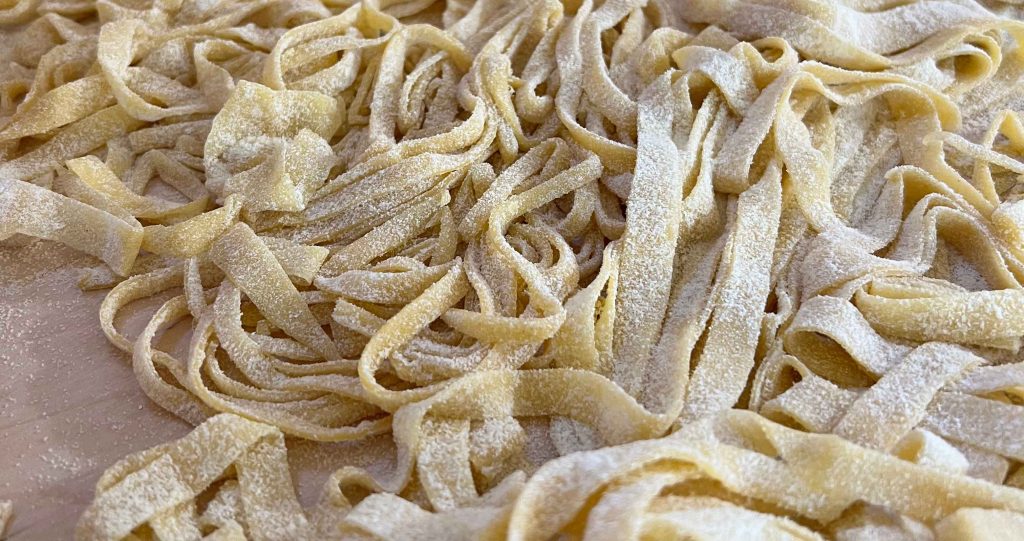
Double Object Pronouns in Italian.
The shortcuts of everyday speech.
Tu ti devi lavare le mani.
Devi LAVARTI le mani!
Davvero, prima di preparare il pasto devi LAVARTELE!
You must wash your hands! Really, before preparing the meal, you must wash them!
Come scusa!? Excuse me!?
How did LAVARTI become LAVARTELE!!??
This is a perfect example of how DOUBLE OBJECT PRONOUNS work in Italian.
To say: “You must wash them!” in Italian, we say: “Devi lavartele!”
Let’s break it down and see how we got from Point A to Point B.

Cosa sono i pronomi diretti e indiretti?
What are direct and indirect pronouns?
Come in inglese, anche in italiano ci sono scorciatoie per esprimersi senza ripetere le stesse parole. Questi piccoli elementi linguistici che usiamo per sostituire parole o frasi si chiamano pronomi diretti e indiretti. I pronomi rendono il discorso più fluido e naturale, evitando di ripetere parole inutilmente. Imparare a usarli è un passo importante per padroneggiare l’italiano parlato.
As in English, in Italian there are shortcuts to avoid repeating the same words. These small linguistic elements that we use to replace words or phrases are called direct and indirect pronoun. Pronouns make speech more fluid and natural, avoiding unnecessary repetition. Learning to use them is an important step in mastering spoken Italian.

I pronomi diretti e indiretti possono sembrare complicati all’inizio,
ma con un po’ di pratica diventano una seconda natura.
Direct and indirect pronouns might seem tricky at first,
but with a bit of practice, they’ll become second nature.
Ricordati: “Se non ti eserciti, non te lo ricorderai!”
Remember: “If you don’t practice, you won’t remember them!”
Italian pronouns in action!
Facciamo un esempio con la pasta!
Let’s try an example with pasta!
Mangi la pasta?
Sì, mangio la pasta. La pasta è molto buona.
Tu fai la pasta ogni giorno?
Puoi fare la pasta di nuovo domani?
Do you eat the pasta? Yes, I eat the pasta. The pasta is very good. Do you make the pasta every day? Can you make the pasta again tomorrow?
Whew! That’s a LOT of pasta! Saying it over and over is exhausting! In everyday conversation, we often use shortcuts, like substituting little filler words for the thing we’re talking about. It’s quicker, easier, and saves energy—so we have more time to actually eat the pasta. 😂
Now, let’s try this again, using DIRECT OBJECT PRONOUNS to simplify things!
La mangi?
Sì, la mangio. È molto buona.
Tu la fai ogni giorno? Puoi rifarla domani?
You eat it? Yes, I eat it. It is very good. Do you make it every day? Can you make it again tomorrow?
Isn’t that so much better? We got through the conversation in record time! And now, instead of just talking about the pasta, we’re finally eating it—and ready for a second helping!
Keep in mind: Direct Object Pronouns (and Indirect Pronouns) only work if the speakers already know the subject of the conversation. If someone were to walk into the room mid-conversation, they’d have no idea what “it” was referring to!

Un ripasso sui pronomi indiretti
Indirect Pronoun Refresher
Remember direct pronouns answer the question
“what?” or “whom?”
mi, ti, lo, la, l’, ci, vi, li, le, ne
PRESENT TENSE
Mangi la pasta? Sì, la mangio. = (Mangio la pasta.)
Leggi il libro? Sì, lo leggo. = (I read the book)
PAST TENSE
Hai mangiato la pasta? Sì, l’ho mangiata. = (I ate the pasta.)
Avete comprato il pane? No, non l’abbiamo comprato. = (We didn’t buy the bread)
Quick Tip: In the past tense (passato prossimo), when using direct object pronouns, the past participle of the verb must agree in gender and number with the direct object. For example:
La pasta is feminine, so mangiato changes to mangiata.
Similarly, if the object were plural, like le lasagne, it would become mangiate.
Un ripasso sui pronomi diretti
Direct Pronoun Refresher
Remember indirect pronouns answer the question
“to whom?” or “for whom?”
In Italian, the preposition “a” is always used before an indirect object noun.
Me — a me
Ti — a te
Le — a lei
Gli — a lui
Ci — a noi
Vi — a voi
Gli — a loro
Parlo spesso alle mie amiche italiane. Gli parlo spesso.
I often speak to my Italian friends. I speak to them often.
Lucia non dà la pillola al figlio. Lucia non gli dà la pillola.
Lucia doesn’t give the pill to the child. Lucia doesn’t give to him the pill.
Desidero scrivere a lui e a lei. Desidero scrivergli.
I want to write to him and to her. I want to write to them.

Come combinare i pronomi diretti e indiretti?
How do you combine direct and indirect pronouns?
Che cosa succede quando vuoi combinare i pronomi diretti e indiretti? Nota che, con l’eccezione di “gli,” tutti i pronomi indiretti (mi, ti, ci, si, vi) sostituiscono la loro vocale finale “i” con una “e” prima dei pronomi diretti lo, la, li, le e ne. Invece, il pronome indiretto “gli” aggiunge una “e,” diventando “glie,” e si attacca al pronome diretto.
What happens when you want to combine direct and indirect pronouns? Note that, with the exception of “gli,” all indirect object pronouns (mi, ti, ci, si, vi) replace their final vowel “i” with an “e” before the direct object pronouns lo, la, li, le, and ne. The indirect object pronoun “gli” instead adds an “e,” becoming “glie,” and attaches to the direct pronoun.
Mi (a me – pronome indiretto) + lo, la, li, le, ne (pronome diretto) = me lo, me la, me li, me le, me ne
Ti (a te – pronome indiretto) + lo, la, li, le, ne = te lo, te la, te li, te le, te ne
Le (a lei – pronome indiretto) + lo, la, li, le, ne = glielo, gliela, glieli, gliele, gliene
Gli (a lui – pronome indiretto) + lo, la, li, le, ne = glielo, gliela, glieli, gliele, gliene
Ci (a noi – pronome indiretto) + lo, la, li, le, ne = ce lo, ce la, ce li, ce le, ce ne
Vi (a voi – pronome indiretto) + lo, la, li, le, ne = ve lo, ve la, ve li, ve le, ve ne
Gli (a loro – pronome indiretto) + lo, la, li, le, ne = glielo, gliela, glieli, gliele, gliene
Esempi / Examples
Rita non ci ha detto la verità. = Rita did not tell us the truth.
Rita non ce l’ha detta. = Rita didn’t tell it to us.
È tornato per darti gli assegni. = He came back to give you the checks.
È tornato per darteli. = He came back to give them to you.
Tu devi lavarti le mani. = You must wash your hands.
Tu devi lavartele. = You must wash them.
Tocca a te! / Now your turn!
Ecco alcuni esercizi per te (dopo aver lavato le mani, ovviamente!)
A few excercises for you (after you’ve washed your hands if course!)
Compito / Homework
Riscrivi questa frase con i pronomi diretti e indiretti.
Identify the direct object (what or who is directly affected by the verb).
Identify the indirect object (to whom or for whom the action is performed).
Replace the objects with the appropriate pronouns, keeping gender, number, and word order in mind. Double-check verb agreements in the past tense (passato prossimo) where required.
Lavi le mani prima di cucinare la pasta.
(Wash your hands before cooking pasta.)
Soluzione → Le lavi prima di cucinarla.
Il bambino non vuole lavarsi le mani. Devi lavargliele tu.
(The child doesn’t want to wash his hands. You have to wash them for him.)
Ho chiesto a Marco di preparare la pasta per noi.
(I asked Marco to prepare the pasta for us.)
Puoi dare gli ingredienti per la pasta a tua sorella?
(Can you give the ingredients for the pasta to your sister?)
Non abbiamo lavato le mani ai bambini prima di cena.
(We didn’t wash the children’s hands before dinner.)
Quando prepari la pasta, dai le istruzioni agli ospiti?
(When you prepare pasta, do you give the instructions to the guests?)
Non dimenticare di lavare le mani a tuo figlio dopo aver cucinato.
(Don’t forget to wash your son’s hands after cooking.)
Ho promesso ai bambini di farli aiutare a preparare la pasta.
(I promised the kids to let them help prepare the pasta.)
Traduci queste frasi / Translate these sentences
Rewrite each sentence inserting the correct Direct or Indirect Pronoun
Wash your hands before cooking pasta.
He gave her many flowers for her birthday.
He gave her them (flowers) for her birthday.
I cannot tell it to (plural) you until tomorrow.
Complete these sentences using
combined direct and indirect pronouns:
Hai lavato le mani al bambino?
→ Sì, __________.
Puoi preparare la pasta per noi?
→ Sì, __________.
Mi hai dato la ricetta della pasta?
→ Sì, __________.
Hai detto ai tuoi figli di lavarsi le mani?
→ Sì, __________.
Puoi portare gli ingredienti al cuoco?
→ Sì, __________.
Buoni studi!!! Divertitevi!
Buona fortuna e buon divertimento con i pronomi italiani!
Good luck and have fun with Italian pronouns!











Cara Matta,
Sono così felice di aver trovato la tua pagina web! (i’m a beginner and cheated to come up with that sentence, ma e’ vero!) I especially find helpful your short italian entries followed by english – so one can look back and forth as needed w/o losing track of the italian sentence!
Grazie mille, minou
Ciao Minou! Benvvenuto/a! Sono contenta che tu sia qui! Let me know if you have any questions as you begin your Italian language journey! Happy to help in any way! <3